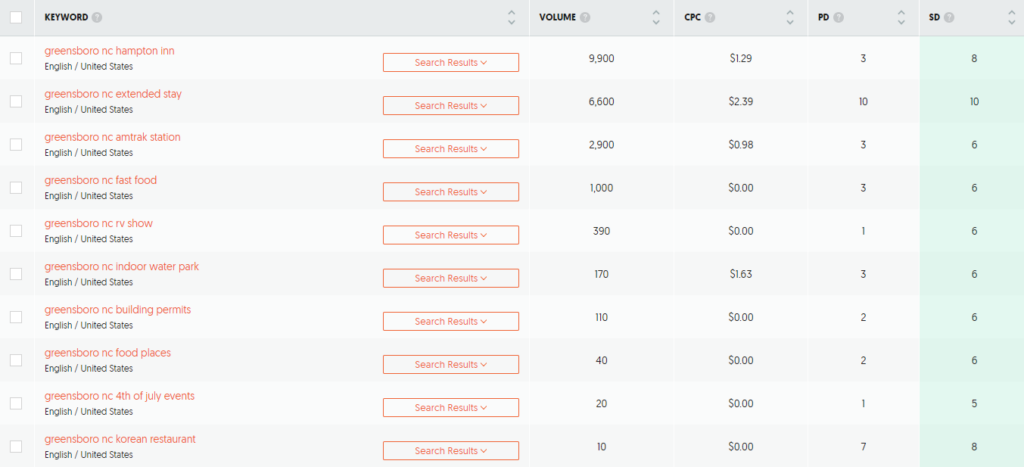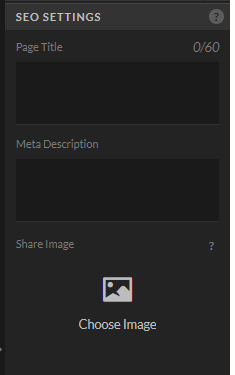You know the ins and outs of the real estate market, but real estate SEO might be a bit of a mystery. You’re eager to dive in because you’ve heard about the incredible benefits it can bring to your business. Well, you’re in luck! After reading this article, you’ll have all the essential knowledge to kickstart your real estate SEO journey.
I’ve broken it down into four easy-to-follow parts…
- What SEO is and how it works
- SEO terminology
- Keyword research & brainstorming blog ideas
- Implementing SEO on your website
Let’s get started!
What is SEO in Real Estate & How Does It Work
SEO stands for “Search Engine Optimization.” Meaning we’re optimizing a piece of content or page of your website specifically to satisfy search engines like Google, Bing, Microsoft, and more. In this article, we’ll focus on Google since it is one of the most popular search engines.
Without SEO, your website will only be found if people type in your URL directly or you pay for traffic ads to land on your website.
The magic of SEO in real estate is that when someone goes on Google and types in keywords or phrases related to your service and area, you can show up as one of the results and potentially be clicked. And if done correctly, you’ll be able to attract and gain free traffic from buyers and sellers looking for realtors like yourself.
How To Show up on Google as a Real Estate Agent
After you have your website ready and optimized, you’ll want to register it with Google. You’ll need to:
- Set up a free Google Search Console Account
- Connect Google Search Console to your domain via DNS settings
- Submit your sitemap
This allows search crawlers—or as some people like to call them “spiders”—to inspect, read, and index your website. Think about it as if Google is adding your business to their directory.
Once you’ve done the technical setup, it can take anywhere between 3-6 months to start seeing traction on your website. But keep in mind, that you might not show up on the first, second, or third page, as there could be a lot of competition fighting for the same spot.
Just like in real estate, SEO requires patience and consistency. But once you’ve done the groundwork, it can be a long-lasting reward.
Real Estate SEO Terminology
The next thing you’ll want to understand is the terminology. And yes, there’s a lot of techy jargon thrown around in the world of SEO. But here’s a breakdown of key real estate SEO terminology to know…
SERP: stands for Search Engine Results Page. After entering words into Google, the page that loads with results is the SERP.
Meta Title: is the title of a specific website page. It tells people and search engines what your page is about when they see it listed in search results. It’s normally between 20-60 characters and appears at the top of your browser window. See the image below for an example.
Meta Description: is a short description of a specific website page. It shows up under your meta title and is normally between 50-150 characters.
Keywords: are words and phrases people type into search engines to find what they are looking for. These are crucial for SEO because they help determine where your website shows up in search results. By understanding and using the right keywords on your website and in your content, you can improve your visibility and rank higher when people search for topics related to what you offer.
URL: which stands for Uniform Resource Locator, is the address used to access your website on the internet. The URL includes the protocol (HTTPS) plus the domain (www.yoursite.com).
DA: stands for Domain Authority. It is a score between 1-100 that determines the strength of your website page’s ability to show up on the SERP. To increase your score you can create keyword-targeted blog posts, optimize your website with on-page SEO, and have backlinks pointing to your URL.
Backlinks: links from one website to another website. They’re important for real estate SEO because search engines, like Google, see backlinks as votes of confidence. But it is important to also consider the quality of where the backlinks come from and go to. So staying within the same area of topic is key. For example, it would be confusing to see a pet product site share a link to a blog about first-time home buyers.
Sitemap: is a file that lists all the web pages of your site, helping search engines like Google understand your website structure. It’s like a map that guides search engines to all your important pages. It also makes it easier for them to crawl and index your site’s content. This can be particularly useful for new websites, large websites with many pages, or sites with rich media content.



How to Keyword Research for Real Estate Agents
Now that you know the real estate SEO lingo, let’s learn how to find SEO opportunities for real estate agents. It all starts with keyword research. But first, you need to determine your niche.
Step 1) Determine your area and niche.
Focusing on a specific niche might seem like you’re limiting your client base, but it’s actually a smart move. When you become a go-to expert in one area, you not only capture that market but also attract attention from nearby communities.
- What city or town do you want to be known as the market expert for?
- What type of client or audience do you want to be the go-to real estate agent for?
People value expertise and are drawn to professionals who stand out in their field. This way, you build a strong sphere of influence (SOI), and over time, you’ll notice that you’re not just getting leads from your niche but from outside it too, thanks to your online reputation.
Here are a few examples of niches for real estate agents…
- Real Estate Agent for First-Time Home Buyers in Seattle WA
- Realtor for Divorcing Couples in Tampa, FL
- Real Estate Agent for Military Families in Las Vegas, NV
- Probate Realtor in Bakersfield, CA
If you don’t have a specific type of client yet, focusing on a hyper-local market is also a great start. Meaning, choosing a city or town that is outside the metropolis.
Step 2) Keyword Research
Now that you know what you want to rank for, let’s dive into finding the keywords for your site. Using tools like Semrush, UberSuggest, or Mangools can help you view a specific keyword’s search volume, competition levels, and who’s currently ranking for them.
Some of these tools offer a free plan or trial. Once you decide on the tool, you can start with these search queries.
In this example, we’re working with a Realtor based out of Greensboro North Carolina. So we’ll use Ubersuggest and enter a few keyword phrases to check out their metrics.
- “Realtor in Greensboro NC”
- “Greensboro NC”



As you can see, there are an estimated 1,000 searches per month for “Realtor in Greensboro NC” with a score of 65 for SEO difficulty, which is on the higher end. So this might be very challenging for someone just starting to get into real estate SEO, but not impossible.
Playing around with different words and phrases during your keyword research can lead to surprising discoveries about what grabs people’s attention. It’s also a good idea to organize your findings, keeping track of the keywords you intend to use, either in a spreadsheet or directly within your keyword tool. This organization can really streamline your process and help you stay on top of your SEO game.
Step 3) Content Creation
There are a few ways to come up with blog content ideas. Consider what your audience is interested in or questions they frequently ask. Engaging with your community through surveys or social media can also spark ideas. Additionally, think about evergreen content that remains relevant over time, how-to guides, industry news, and personal success stories or case studies to provide value and attract readers.
Since we’re creating hyper-local content for your community. You’ll research what queries come up when you enter your city and state.
Let’s look into what people are looking for when they use the keyword “Greensboro, NC”…



You’ll also be able to see questions related to your keyword…



After checking out these results, it’s clear there are loads of fantastic opportunities. And your odds of ranking high for these keywords are looking pretty darn good. Remember, you want to be the go-to real estate agent in your neck of the woods. Even if some of these searches aren’t directly about real estate, they’re about your community—and that’s your turf. So, aim to be the ultimate resource for all things local to snag more eyeballs and referrals your way.
Here are some content ideas based on the search results:
- Keyword: Greensboro NC RV Show | Blog Post: Your experience attending one of these shows, with details such as the price of admission, parking info, things you wished you knew before attending, your favorite part, and the quality of RVs.
- Keyword: Greensboro NC Fast Food | Blog Post: You can have multiple articles towards this keyword for example, 10 cheapest fast food places in Greensboro or 10 fast food places that stay open late, and more.
- Keyword: is Greensboro NC a good place to live | Blog Post: Answering this question with your experience, statistics, and rating neighborhoods based on crime rate or quality of life can position you as the market expert.
The more you post about your community, the more Google sees you as the go-to expert.
Consistently writing about topics related to your area or niche can signal to search engines like Google that you’re an expert in that specific area. This is because search engines prioritize content that is relevant, high-quality, and demonstrates expertise on a particular topic.
By consistently producing valuable content about your area, such as local real estate market updates, community events, neighborhood guides, and insider tips, you can establish yourself as a trusted authority in your field. This can lead to higher search engine rankings, increased visibility, and ultimately more traffic and leads for your site.
How to Apply Real Estate SEO to Your Website
Now let’s put it all together so that it helps search engines crawl and index your realtor site more effectively. For every page & blog post, you’ll want to make sure that you have…
- Custom meta title: include your keywords and location
- Custom meta description: include your primary, secondary keywords, and location
- Optimized URL: keep it clear and short. “.com/about” not “.com/about-the-best-realtor-in-the-west”
- Social Sharing Image: when you share your URL/links an image will also show up. Pick one that is aligned or describes your business.
- Alt-text for photos: When images fail to load or break, it will display the alternative which is the text you input to describe the photo.
- Appropriate Text-tags: You should have only one H1 per page and blog. Other headlines, paragraphs, or text should be tagged as H2, H3, H4, or P for paragraphs.
Depending on your website’s platform, you’ll find a spot to add your SEO details. If you’re unsure where to find it, just check out the platform’s help section. You’ll likely find a step-by-step guide to help you locate and fill in those SEO fields.



There’s plenty more to explore when it comes to real estate SEO! But I hope this real estate SEO guide gives you a solid foundation to build on. Remember, getting started is the toughest part. But once you find your groove and start nurturing your site with blogs, it’ll flourish over time. All the effort you invest now will pay off big time, and your website will thrive for years to come.
If you’d like to learn more or chat about working with an SEO expert, explore my real estate SEO services or reach out through my contact form. Good luck!
SEO for Real Estate Websites Made Easy

Meet Your Web Designer & SEO strategist
CONNECT
JOIN
March 11, 2024
Learn to generate and capture real estate leads with SEO and a strategic Website Design.
I'm giving you the keys to a better website. Subscribe to receive all of the tips.